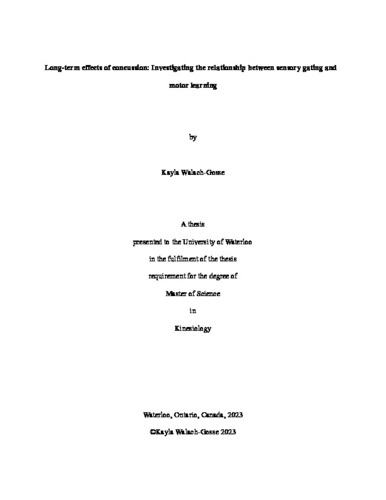| dc.contributor.author | Walach-Gosse, Kayla | |
| dc.date.accessioned | 2023-09-14 20:04:29 (GMT) | |
| dc.date.available | 2023-09-14 20:04:29 (GMT) | |
| dc.date.issued | 2023-09-14 | |
| dc.date.submitted | 2023-09-05 | |
| dc.identifier.uri | http://hdl.handle.net/10012/19864 | |
| dc.description.abstract | Motor learning relies on the sensorimotor system to interpret, adapt, and integrate sensory inputs to guide motor behavior. A key tenet of the somatosensory system is the ability to inhibit irrelevant information from the CNS to protect higher cortical areas from information overload (sensory gating). Movement and attention can contribute to this process through movement-related gating and relevancy-based facilitation, respectively. Sensory gating occurs at early cortical processing stages and has been shown to be impacted in individuals with a history of concussion. Past work from our lab found a delay in relevancy-based facilitation in a group with a history of concussion compared to healthy controls. The current work aimed to understand the behavioral manifestations that result from disruptions to relevancy-based gating modulations at early cortical processing stages in the concussion population. A total of 40 participants were recruited to participate in this study with 25 in the concussion history group (Hx) and 15 in the control group (No-Hx). This study consisted of 2 experimental sessions that occurred 24 hours apart. During session 1, somatosensory-evoked potentials (SEPs) were elicited via median nerve stimulation while subjects performed a task that manipulated their focus of attention toward or away from proprioceptive feedback. Subjects then completed an implicit motor sequence learning task relying solely on proprioceptive cues. Individuals performed a retention test at session 2, followed by a visual attentional blink (AB) task. The AB is a phenomenon elicited by the rapid presentation of sequential targets which results in reduced accuracy of detecting the second target at the expense of detecting the first target. The No-Hx performed the implicit learning task at session 1 and a retention test at session 2 because SEP and AB data were compared to control data previously collected by this lab. SEP data replicated past work showing an absence of relevancy-based facilitation at early cortical processing stages (N20-P27) that emerged at later processing stages. Our Hx showed evidence of relevancy-based facilitation at either the P50-N70 or the N70-P100 consistent with past work that found this to occur at the N70-P100. Performance on the learning task was not significantly different between the Hx and No-Hx. Performance on the AB task revealed greater AB magnitude in the Hx compared to the No-Hx. Collectively, these results suggest a compensatory strategy in the Hx that enables them to learn to the same degree as controls. However, when the attentional system is taxed with high temporal demands there are decrements in performance. These results are of particular importance given that these individuals are at an increased risk of sustaining subsequent concussions, and musculoskeletal injuries. | en |
| dc.language.iso | en | en |
| dc.publisher | University of Waterloo | en |
| dc.subject | concussion | en |
| dc.subject | motor learning | en |
| dc.subject | sensory gating | en |
| dc.subject | attention | en |
| dc.title | Long-term effects of concussion: Investigating the relationship between sensory gating and motor learning | en |
| dc.type | Master Thesis | en |
| dc.pending | false | |
| uws-etd.degree.department | Kinesiology and Health Sciences | en |
| uws-etd.degree.discipline | Kinesiology | en |
| uws-etd.degree.grantor | University of Waterloo | en |
| uws-etd.degree | Master of Science | en |
| uws-etd.embargo.terms | 0 | en |
| uws.contributor.advisor | Staines, Richard | |
| uws.contributor.affiliation1 | Faculty of Health | en |
| uws.published.city | Waterloo | en |
| uws.published.country | Canada | en |
| uws.published.province | Ontario | en |
| uws.typeOfResource | Text | en |
| uws.peerReviewStatus | Unreviewed | en |
| uws.scholarLevel | Graduate | en |

